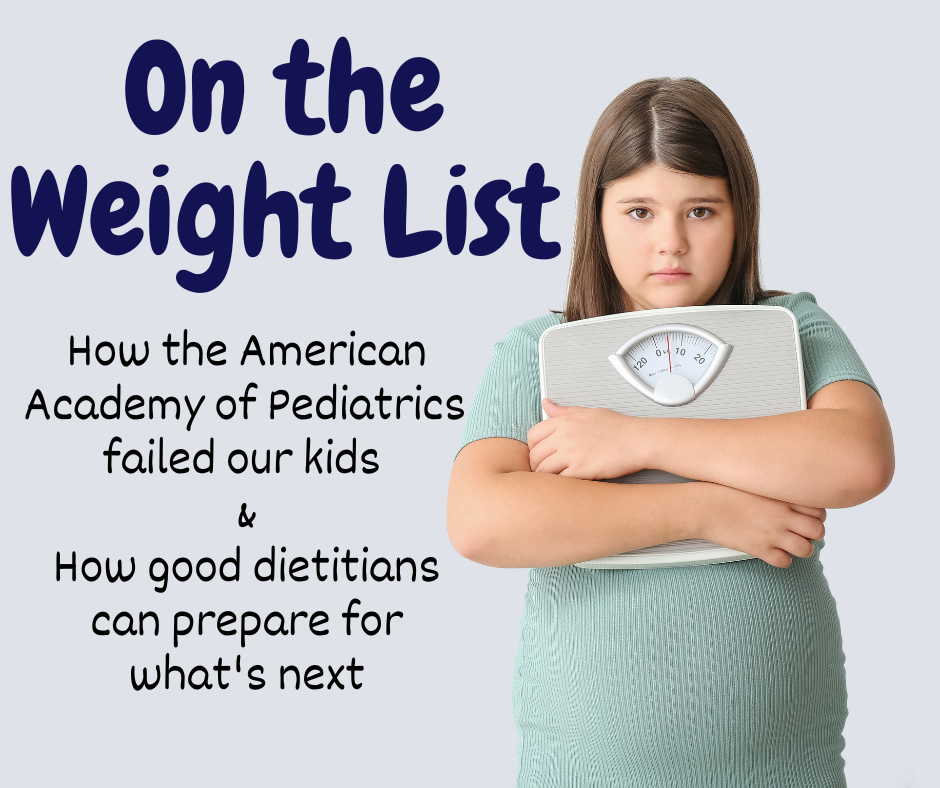The recent AAP guidelines are hypocritical and contradictory, harmful to children, scientifically unsound, and based on bad medicine.
They are embarrassing to good pediatricians and make it clear that organization leadership is biased and out of date.
How the recent AAP guidelines embarrass the AAP:
#1: The whole point of the guidelines is that big kids need to shrink.
THIS IS INCORRECT & CRUEL.
#2: The guidelines assume shrinking a child’s body will improve their health.
THIS IS UNFOUNDED & DANGEROUS.
#3: The guidelines ignore that there is no lasting, effective body-shrinking method for children besides starvation.
THIS IS BAD SCIENCE.
#4: All of the mentioned body-shrinking methods assume that bigness is caused by calories in/calories out.
THIS IS IGNORING REALITY.
#5: The guidelines use BMI to determine who should be shrunk.
THIS IS OUTDATED, UNSCIENTIFIC & BAD MEDICINE.
#6: The full report mentions social determinants of health & referring to dietitians. Yet this is ignored in the summaries where the key points mostly focus on surgery and drugs.
THIS IS PANDERING TO PROFIT.
#7: The guidelines suggest making body-shrinking recommendations without a nutrition assessment.
THIS IS BAD MEDICINE.
#8: They reference studies a) with terrible outcomes b) funded by industry.
THIS IS BAD SCIENCE.
#9: Practicing pediatricians weren’t consulted. Good pediatricians are opposed to these guidelines.
THIS IS BAD LEADERSHIP.
#10: The guidelines prioritize malnourished smaller kids over bigger, healthy kids.
THIS IS UNFORGIVABLE.
As damaging as we – and our weight-inclusive pediatrician colleagues – think this weight-focus is, it makes sense to be prepared for when it filters down to our patients.
Here are possible responses I’ve brainstormed when a young patient or parent of a youngster reports their doctor recommended weight loss. I’d love to hear yours.
What did you think about that?
Do you feel like your doctor knows your specific situation or were they just giving generic advice?
How did the recommendation make you feel? Did it impact your trust in your doctor? Would you consider telling them at your next appointment? Or is it time to find a different provider?
Did the doctor explain their reasoning?
(If yes) Do you agree with that thinking? May I share my point of view? Would you consider a second opinion/appointment with a specialist?
(If no) Would you like to follow up with them to get more information? I could help you come up with questions to ask, such as What specific benefits do you foresee from me/my child losing weight? Are there other methods for me/my child to get those same benefits? Are you recommending a specific method? What is the safety of that method for someone my age/my child’s age? What are the possible complications? (If applicable) How do you imagine that will impact my/my child’s eating disorder? What are the outcomes of that method for people my age/my child’s age with my/my child’s condition?
Based on what I know about you, I don’t agree with that recommendation. Would you like to hear my thoughts?
It sounds like your doctor imagines that your weight/your child’s weight is a problem. From what I know about you, weight hasn’t been a problem for you/your child. The way you/others view your weight/your child’s weight has sometimes been a problem. Would you consider working to change your viewpoint rather than your/your child’s size?
You’ve been striving to improve your eating and have made a lot of progress. I’m concerned that switching to a focus on weight will make it harder for all the work you’re doing on eating.
Have you tried changing your weight before? What was the outcome? What do you imagine would be different this time?
Focusing on weight can make it seem like all the work you’re doing is worthless if it doesn’t change your weight. You’ve told me that the changes you’ve already made have helped you and I’d hate for you to feel like they’re worthless.
Some of the reasons people feel better when trying to lose weight are that they feel hopeful for the future when they’re smaller. Are you open to sharing with me your hopes for the future? How would your life be different if your weight was different? I’d love to help you find someone who can help you work toward those things you see in your future, but without needing to harm yourself to get there.
Those are some lines from imaginary conversations I’ve been having with myself. Let me know if you’ve come up with other ideas that might help. I’d love for us to help each other prepare.
Some additional info that may help you gather your thoughts:
Response from Lemond Nutrition, a pediatric nutrition counseling practice:
Ragen Chastain’s thoroughly researched rebuttal
I did email the AAP directly to see if they had a response to the IFEDD statement – of course I will let you know if I hear back.
Hope to connect with you – Jessica

